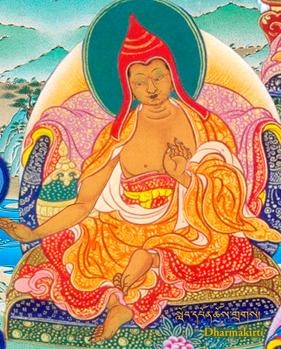Dharmakirti: Difference between revisions
Jump to navigation
Jump to search
No edit summary |
mNo edit summary |
||
| Line 1: | Line 1: | ||
[[Image:Dharmakirti.JPG|frame| | [[Image:Dharmakirti.JPG|frame|Dharmakīrti]] | ||
'''Dharmakirti''' (Skt. Dharmakīrti; Tib. Chökyi Drakpa; [[Wyl.]] ''chos kyi grags pa'') (7th Century) was born to a bramhin family in the South of India. After receiving a bramhanical education, he later became interested in the Buddhist teachings. He then travelled to [[Nalanda]] in order to receive teachings from a direct disciple of [[Vasubandhu]]. Dharmapāla was still living—Dharmakirti received ordination from him—but [[Dignaga]] had passed away. Instead he received instruction from Ishvarasena, who was Dignaga's direct disciple. Having entirely comprehended Dignaga's oeuvre, he became perhaps the greatest master of [[pramana]] and went on to compose the '[[Seven Treatises on Valid Cognition]]'. | '''Dharmakirti''' (Skt. Dharmakīrti; Tib. Chökyi Drakpa; [[Wyl.]] ''chos kyi grags pa'') (7th Century) was born to a bramhin family in the South of India. After receiving a bramhanical education, he later became interested in the Buddhist teachings. He then travelled to [[Nalanda]] in order to receive teachings from a direct disciple of [[Vasubandhu]]. Dharmapāla was still living—Dharmakirti received ordination from him—but [[Dignaga]] had passed away. Instead he received instruction from Ishvarasena, who was Dignaga's direct disciple. Having entirely comprehended Dignaga's oeuvre, he became perhaps the greatest master of [[pramana]] and went on to compose the '[[Seven Treatises on Valid Cognition]]'. | ||
Revision as of 14:23, 25 September 2009

Dharmakirti (Skt. Dharmakīrti; Tib. Chökyi Drakpa; Wyl. chos kyi grags pa) (7th Century) was born to a bramhin family in the South of India. After receiving a bramhanical education, he later became interested in the Buddhist teachings. He then travelled to Nalanda in order to receive teachings from a direct disciple of Vasubandhu. Dharmapāla was still living—Dharmakirti received ordination from him—but Dignaga had passed away. Instead he received instruction from Ishvarasena, who was Dignaga's direct disciple. Having entirely comprehended Dignaga's oeuvre, he became perhaps the greatest master of pramana and went on to compose the 'Seven Treatises on Valid Cognition'.
Writings
- The Seven Treatises on Valid Cognition of which
- Pramanavarttika is the main.
Further Reading
- John D. Dunne, Foundations of Dharmakirti's Philosophy, Wisdom Publications, 2004
- Tom J. F. Tillemans, Scripture, logic, language: essays on Dharmakīrti and his Tibetan successors, Wisdom Publications, 1999